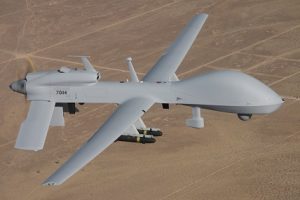Barring political complications, by the end of the summer Congress will have discussed, marked up, and voted on a spending package to fund the government through the upcoming fiscal year. More specifically, this process will determine how much discretionary spending is appropriated to government agencies like the Department of Health and Human Services, Department of Education, Department of Housing and Urban Development, Department of State, and more. By far, the largest portion of this budget will go to fund war and preparations for war, with the Biden administration already requesting $813 billion in discretionary spending for the Pentagon. This represents an increase of roughly $30 billion over the previous year and a continuation of the annual pattern of exorbitant military spending. The costs of war itself, of course, also extend beyond financial considerations, taking a physical toll on human life and our environment. Regardless, there is little pushback on this figure in Congress, and members of both parties may yet vote to increase the level of funding beyond the President’s initial proposition. As Christians who lived through the WWJD era of the 1990s and early 2000s, we would do well to ask ourselves: What would Jesus do with that $813 billion?
Fortunately for us, the writings of past generations of Brethren can get us partway there. In a 1918 Statement on War, the first Annual Conference statement in the online archive, Brethren spoke out strongly against preparations for war, writing that “war or any participation in war is wrong and entirely incompatible with the spirit, example, and teachings of Jesus Christ” (1918). They substantiated this claim with numerous verses from the New Testament which more fully bear it out. To reference just one passage, Romans 12:17, 20-21 says this:
“¹⁷ Do not repay anyone evil for evil. Be careful to do what is right in the eyes of everyone. ²⁰ On the contrary: ‘If your enemy is hungry, feed him; if he is thirsty, give him something to drink. In doing this, you will heap burning coals on his head.’ ²¹ Do not be overcome by evil, but overcome evil with good.”
War, decidedly not good, was off the table. Instead, Brethren strongly encouraged the rulers of our nation to “contribute liberally to the relief of human suffering, both in men and money” (1918). This was perhaps their best answer to the question “What would Jesus do, instead?”
In our present political context, we can be even more specific about the alternatives to war and military spending. In the minds of many Americans, the ongoing spread of COVID-19 remains the most prevalent threat to our safety and health at home and around the world. Globally, over 6 million people have lost their lives to the virus. Pandemics, as it turns out, do not respond well to threats of violent military action. Similarly, climate change cannot be mitigated by armed drones, nor can severe weather events be warded off by nuclear weapons. The U.S. military, as one of the largest polluters in the world, also exacerbates climate change and undermines global stability in the process. Ironically, bills and funding to respond to these exact crises were blocked by Congress, the very same body now expected to dedicate $813 billion to weapons and war. Now is the time to call out this contradiction and to make significant financial investments to address pandemic disease, climate change, poverty, racism, gun violence, and other causes of human suffering.
With or without this historical and moral Brethren lens, it is clear that our military budget is disproportionately large. According to the Stockholm International Peace Research Institute (SIPRI), in fiscal year 2021 the U.S. spent more on defense than the next 9 countries combined. This extreme disparity suggests that the U.S. can afford to make large cuts to the Pentagon and still remain a military powerhouse. Better yet, the U.S. could commit to investing in strategies of diplomacy and peacebuilding, reducing the likelihood that violence would occur in the first place. As individuals and communities suffer from pandemic disease, natural disasters, poverty, violence, inflation, and more, Brethren should stay grounded in our history and be bold enough to look at our massive military budget and ask and answer the age-old question, “What would Jesus do instead?”


